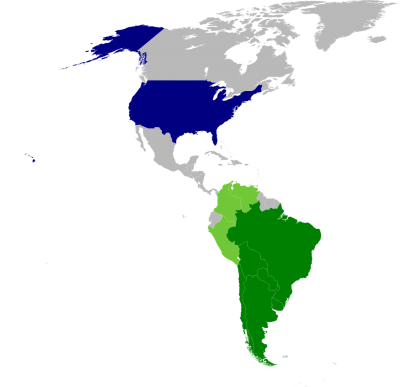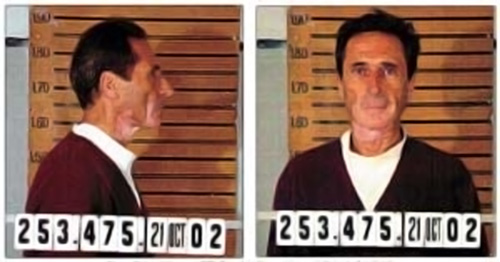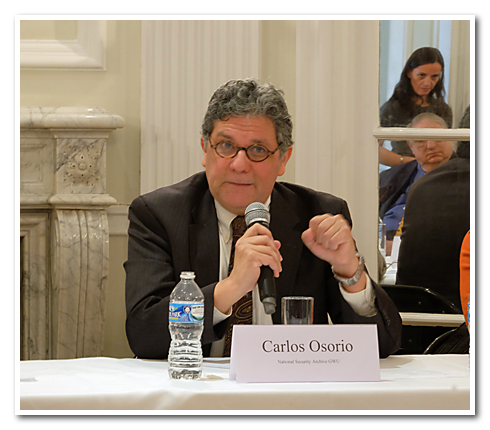Operation Condor: Latin-American Heads of State Condemned by Rome Tribunal, Declassified Docs Reveal Role of Henry Kissinger

Rome Court Concludes 3-Year Trial on Multinational Repression in Latin America
National Security Archive Provided Declassified Evidence to Tribunal, Hails Historic Ruling
A tribunal in Rome, Italy, today sentenced two former heads of state and two ex-chiefs of security forces from Bolivia and Peru, and a former Uruguayan foreign minister to life imprisonment for their involvement in the coordinated, cross-border system of repression known as “Operation Condor.” The National Security Archive, which provided testimony and dozens of declassified documents as evidence to the tribunal, hailed the ruling. Today’s posting on the Archive’s web site includes several exhibits from the trial.
One declassified Department of State document that the Archive provided to prosecutors stated that Argentina, Brazil, Bolivia, Chile, Paraguay and Uruguay
“have established Operation Condor to find and kill terrorists … in their own countries and in Europe.” “… [T]hey are joining forces to eradicate ‘subversion’, a word which increasingly translates into non-violent dissent from the left and center left.” Their definition of subversion, according to the document, was so broad as to include “nearly anyone who opposes government policy.”
The document notes that former Foreign Minister Blanco of Uruguay was one of those behind this vision.

Former Uruguayan Foreign Minister Juan Carlos Blanco (Photo: Flores.org.uy)
In another document introduced in the trial, Peru’s former defense and prime Minister Richter Prada claims that three Argentine fugitives were “legally expelled and delivered to a Bolivian immigration official in accordance with long-standing practice.” The document goes on to say that the fugitives are probably “permanent disappearances.”
The Rome trial considered the disappearance of 42 dual citizens – 33 Italian-Uruguayans, 5 Italian-Argentinians and 4 Italian-Chileans. The tribunal sentenced to life in prison former military dictator Francisco Morales Bermudez and the prime minister at the time, Pedro Richter Prada from Peru; former dictator Luis Garcia Meza and minister of interior Luis Arce Gomez from Bolivia; and former Uruguayan Foreign Minister Juan Carlos Blanco (1973-76). Two Chilean military, Hernán Jerónimo Ramírez and Rafael Ahumada Valderrama, were also sentenced to life. Recently deceased former head of the Uruguayan National Security Council, Gregorio Alvarez, was also one of the initially accused, along with the head of the Chilean secret police (DINA), Manuel Contreras, and DINA operative Sergio Arellano Stark (both deceased).
Surprisingly, the tribunal acquitted infamous Uruguayan intelligence operatives in Argentina from 1976 Nino Gavazzo, Jose Arab, and Jorge Silveira; along with Jorge Troccoli, a Uruguayan marine intelligence officer operating in Argentina in 1977. Ten other Uruguayan military were acquitted. Interviewed in Rome, former prosecutor and current director of the Uruguayan National Institution of Human Rights Mirtha Guianze deplored the tribunal acquittals. Relatives of the Uruguayan victims have indicated they will appeal.
The trial had its origin in a complaint filed in 1999 by six relatives of victims: Cristina Mihura, wife of Bernardo Arnone; Marta Casal del Rey, wife of Gerardo Gatti; María Luz Ibarburu, mother of Juan Pablo Recagno; María Bellizzi, mother of Andrés Bellizzi; Aurora Meloni, wife of Daniel Banfi, and Claudia Allegrini, wife of Lorenzo Viñas.
In 2001, Cristina Mihura and prosecutor Giancarlo Capaldo visited the National Security Archive seeking assistance in locating and compiling documentary evidence. Capaldo requested the indictment of the defendants in 2006. The trial started in 2013 and the hearings and debate in February 2015.
According to Carlos Osorio, the Archive’s Southern Cone analyst, “the sentences are the result of the unquenchable thirst for justice of dozens of relatives and victims.” Osorio testified before the court on May 19-20, 2016, and supplied the court with 100 declassified records.

Listen to Archive analyst Carlos Osorio (pictured above at the Argentine embassy in Washington on March 23, 2015) testify at the Rome trial, where he provided dozens of declassified documents as evidence.
Summary of Document 1
“You will have to make an international effort to have your problems understood. Otherwise, you, too, will come under increasing attack. If there are things that have to be done, you should do them quickly. But you must get back quickly to normal procedures.” When Guzzetti suggests that “The terrorists work hard to appear as victims in the light of world opinion even though they are the real aggressors,” Kissinger agrees. “We want you to succeed,” he concludes. “We do not want to harass you. I will do what I can … “

